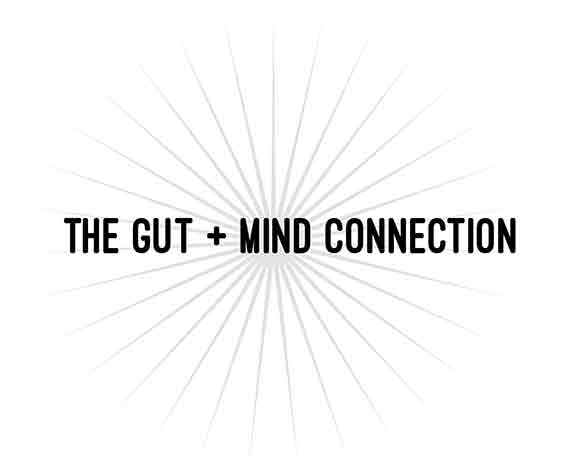The Second Brain
When you hear the word brain, what’s the first thing that comes to mind? For me, it’s a 3-pound soft, shiny, deeply folded grayish-white mass about the size of two fists.
Well, another brain is not as popular, and it has the same neurotransmitters and nerve cells as the one we have in our head, but it’s in our bellies. It’s called the “second brain,” and this is what Columbia University professor Michael Gershon described for the actions of the gut and enteric nervous system (ENS).” As someone who’s experienced gastrointestinal tract issues firsthand triggered by high stress, I hope this helps if you’ve suffered from the same and have no idea why. For me, it would occur during times of transition or change – like a big move or even around the holidays. Uncomfortable episodes went on for a few years during different periods in my twenties and thirties, and I was determined to get to the root of the problem. So I dove into learning about the ins and outs of the gut + brain connection and was fascinated by the power of this tight-knit interconnected system.
How the Mind Speaks with the Gut and Vice Versa
In Emeran Mayer, MD’s book, The Mind-Gut Connection, he explains, “our emotions, brain, and gut are uniquely connected.” This explains the phenomenon of the “gut feeling,” or having butterflies in the stomach just before a speech, presentation, or when your hot crush walks by. He describes this as “the emotion-generating circuits of our brain in our bellies – which is a rich language between brain circuits showing the brain and the gut are tied together like no other organ. It’s also home to trillions of microbiota living in our gut consisting of 2,000 species of bacteria that aid in this communication.
Dr. Mayer’s research about the communication between our GI tract and the brain reveals that “Ninety percent of the signals conveyed through the vagus nerve (the longest nerve in the human body) travel from the gut to the brain, while just 10 percent of the traffic runs in the opposite direction.” So, amazingly, the body can affect the mind more often than the mind affects the body – four hundred times more!
Now that I have a better understanding of the power of this connection, I’ve taken an entirely new approach to my self-care practices. Different kinds of gut reactions one might experience could include episodes of indigestion, heartburn, constipation, or irritable bowel syndrome (IBS). So now, I get curious instead of acting upon my first response, which led me straight to getting probed and prodded with a scope. I check my stress levels, assess what’s going on internally and externally that could create emotional upset (for example – relationship difficulties, family trouble, financial strain, etc.), and take some deep belly breaths to relax. I also might consider an Epson salt bath, acupuncture, massage, or journaling. With a better understanding of the powerful tie between the gut and mind, I’m constantly reminded of the importance of taking time to reconnect with my body to assess my stress levels.
Harness the Power of the Gut + Mind Connection
The Gut+Mind Connection I have shared above is simplified to reveal our immense power to help bring our bodies into balance. The key takeaway I’d like to emphasize is this: we have a tremendous potential to get our bodies into balance, and through our emotions, we can learn about ourselves – they are always telling us something. When we take the time to pay attention to our feelings, we can uncover clues about what is happening in the gut, which is a direct mirror of our emotional state. Of course, there are always other circumstances that could create digestive upset – food allergies, dysbiosis (imbalance of our gut microbiota), autoimmune conditions; however, the best place to begin our gastrointestinal health assessment is with our emotions.



